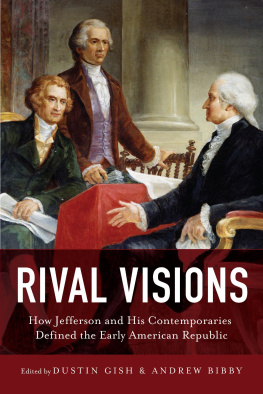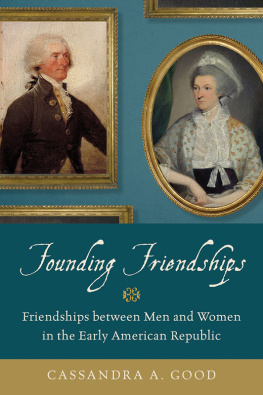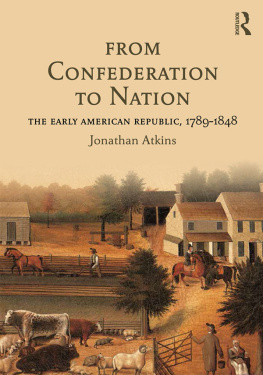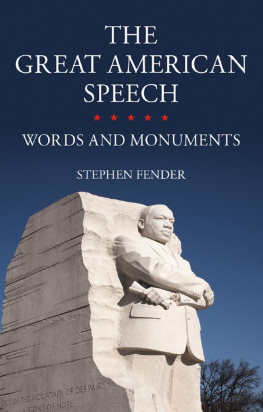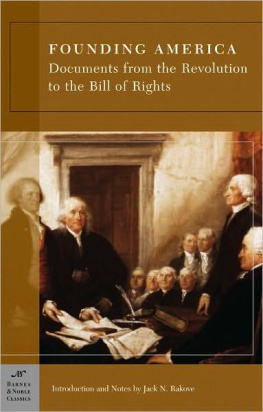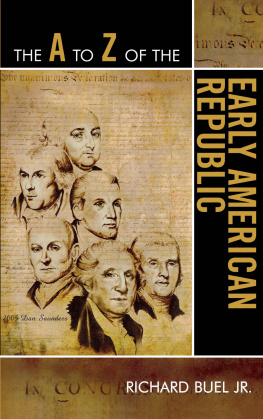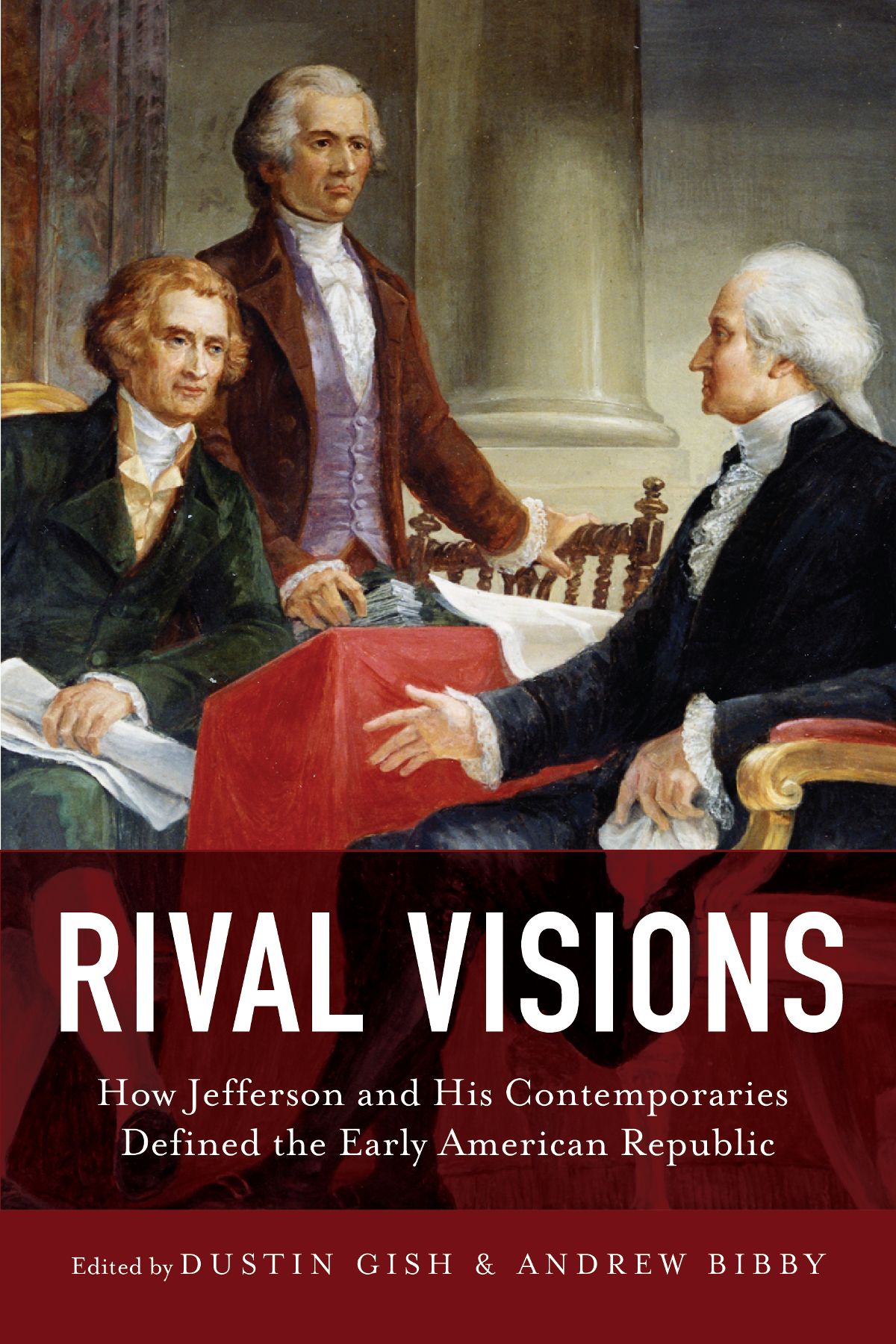
Rival Visions
Jeffersonian America
Charlene M. Boyer Lewis, Annette Gordon-Reed, Peter S. Onuf, Andrew J. OShaughnessy, and Robert G. Parkinson, Editors
Rival Visions
How Jefferson and His Contemporaries Defined the Early American Republic
Edited by Dustin Gish and Andrew Bibby
University of Virginia Press
CHARLOTTESVILLE AND LONDON
University of Virginia Press
2021 by the Rector and Visitors of the University of Virginia
All rights reserved
First published 2021
Library of Congress Cataloging-in-Publication Data
Names: Gish, Dustin A., editor. | Bibby, Andrew, editor.
Title: Rival visions : how Jefferson and his contemporaries defined the early American republic / Edited by Dustin Gish and Andrew Bibby.
Description: Charlottesville : University of Virginia Press, 2021. | Series: Jeffersonian America | Includes bibliographical references and index.
Identifiers: LCCN 2020039799 (print) | LCCN 2020039800 (ebook) | ISBN 9780813944470 (cloth) | ISBN 9780813944487 (ebook)
Subjects: LCSH : Jefferson, Thomas, 17431826Political and social views. | United StatesPolitics and governmentPhilosophy. | United StatesPolitics and government17751783. | United StatesForeign public opinion. | RepublicanismUnited StatesHistory. | Representative government and representationUnited StatesHistory. | United StatesForeign public opinion.
Classification: LCC E332.2 .R58 2021 (print) | LCC E332.2 (ebook) | DDC 320.973/09033dc23
LC record available at https://lccn.loc.gov/2020039799
LC ebook record available at https://lccn.loc.gov/2020039800
Cover art: Washington, Jefferson, and Hamilton fresco in U.S. Capitol, photograph by Theodor Horydczak, c. 19201950 (Theodor Horydczak Collection, Library of Congress, Prints and Photographs Division)
Offer prayers for me at that shrine to which, tho absent, I pay continual devotion. In every scheme of happiness she is placed in the fore-ground of the picture, as the principal figure. Take that away, and it is no picture for me.
Thomas Jefferson, of his beloved future wife, Martha Wayles (Monticello, August 3, 1771)
Contents
Eran Shalev
Darren Staloff
Dustin Gish
Armin Mattes
Daniel L. Dreisbach
John Ragosta
Christa Dierksheide
Peter S. Onuf
Jean Yarbrough
Daniel Klinghard
Charles Hobson
The original inspiration for this volume came following a conference on Thomas Jefferson and his contemporaries hosted in 2013 by the Center for American Studies at Christopher Newport University in Newport News, Virginia. Attended by most of the contributors in this volume, the conference broadened and deepened our conception of the founding era through a focus on the continuing and significant rival visions of the new nation in the American republics tenuous and formative early decades. The conference, made possible by a generous grant from the Jack Miller Center, brought together scholars in political science, history, and American studies from an array of academic institutions (including the University of Virginia, College of William and Mary, College of the Holy Cross, Rutgers University, Virginia Foundation for the Humanities, and the International Center for Jefferson Studies at Monticello). All agreed that the subject of the conference warranted further study and offered a revealing thematic approach for a volume dedicated to the proposition that the early American republic was a work-in-progress, wrought from contested founding visions and persistent rivalries.
We are grateful to the co-Directors of the Center for American Studies, Elizabeth Busch and Nathan Busch, as well as their colleague Jonathan White, for sponsoring the conference. The path to eventual publication of this volume proved unexpectedly prolonged, in part due to our own departures to the University of Houston and Utah Valley University. We owe an obligation, gratefully acknowledged, to our home institutions and especially to Bill Monroe (Dean of the Honors College at UH) and Rodney Smith (Director of the Center for Constitutional Studies at UVU) both for their friendship and for their support of our scholarly endeavors. Peter Onuf provided encouragement at every stage from the genesis to completion of this project, and we are indebted to him for his indefatigable spirit in promoting the study of Thomas Jefferson and the early American republic. We also benefited from the advice of the Senior Executive Editor for UVA Press, Dick Holway, who kept this project moving forward, and (following his recent retirement) from the enthusiasm of his successor, Nadine Zimmerli, who adeptly managed to guide the volume finally to publication. We thank Trinity Rinear for her assistance with the index. The dedication of this volumeborrowing the words of Jefferson himself, which are so often without rivalacknowledges the profound devotion that is offered to a cherished companion whose presence gives meaning to the pursuit of happiness.
T he emergence of the United States of America as a new republic on the world stage capable of persisting through its first decades put to rest some longstanding fears and old doubts about the viability of popular government. In the tumultuous era of its early formation, the American Republic managed not only to survive but to strengthen. As the nation moved beyond infancy into vigorous youthful maturity, the internal political struggles and rivalries that emerged, while contentious, also became a source of vitality. Centralized monarchy no longer represented the only regime compatible with liberty and stability. Popular government and democracy on the grand scale of a modern nation-state proved both viable and successful. Revolutionary resistance to tyranny had given way to constitution-drafting and nation-building; a people, isolated from the rest of the world, distinct in their regional identities, and jealous of their liberties, had set aside most of their differences to unite and form a nation that would be strong as well as free.
In many important respects, the ratification and implementation of the 1787 Constitution was a powerful rebuttal to critics of the American experiment at home and abroad. Yet few Americans would have claimed, during the first years, that ratification was the beginning of an end to urgent political questions. New questions and doubts soon replaced the displaced ones. What is republican liberty, and how is it best secured? What are the conditions for equality? What kind of republic and what kind of economic system should the United States, despite their differences, embrace going forward? On these questions, the great political thinkers of the liberal tradition during the eighteenth centuryJohn Locke, Montesquieu, David Hume, William Blackstoneoffered only general guidance. Out of this theoretical debate, the authors, thinkers, and political observers of the new republic and nation began to fashion a distinctly American tradition of political thought. What emerged was less a consensus, as historians such as Louis Hartz and Richard Hofstadter have argued, than an intellectual upheaval. From 1776 to 1820, leading American statesmen at home as well as attentive observers abroad began the process of articulating a number of distinct intellectual traditions, focused not on the world-historical debate between ancients and moderns but on the historically grounded tensions between and within a rich variety of possible forms of modern republicanisms. In this book, we refer to these emerging political debates and the intellectual period that encapsulates them as rival visions of the Early American Republic. A dedicated study of these contested visions is a unique and timely approach to understanding the emerging American identity. This volume highlights the centrality of Thomas Jefferson as a touchstone for the vigorous debates and competing rival visions that dominated the Early Republic. In his own views as well as in conversations with his friends and in disagreements with his critics, the often-enigmatic Jefferson stands out as a representative of the age in dialogue with his contemporaries. Through the essays herein, this volume aims to study Jeffersonian America as it emerged from a crucible of intense rivalry.
Next page
